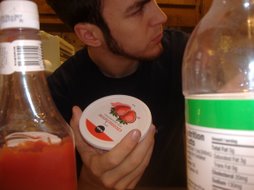
Thursday, April 30, 2009
Tuesday, April 28, 2009
"LOVE REJOiCES WiTH THE TRUTH"
The following is not robust historical-grammatical exegesis. I understand the context of 1 Cor 13 and spiritual gifts, but this is thinking more broadly about love and truth. Enjoy.If love rejoices with the truth and this statement is in the middle of a litany of statements about love, doesn't that mean that every other principle about love should be seasoned with joy?
For example, if "love is patient" is a true reality and we already know that "love rejoices with the truth," shouldn't the patient-love combination include a demeanor of rejoicing? I'm thinking so.
One problem with all this is that the air we breathe redefines these two ideas. Love is painted primarily as sex and tolerance. And truth is whatever is true for you. This kind of "love" cannot rejoice with truth. Further, this kind of "truth" cannot be rejoiced in by love. The ideas of love and truth that are a happily married couple together in 1 Cor 13 are ideas of love and truth that stream from the personhood of God.
Therefore, biblically speaking, truth is absolute, but is not static. It is relatable. Furthermore, love is a source and a stream. "God is love. Love is from God" [1 Jn 4.7-8]. The deal is that both of these are defined on the basis of who God is and what He is doing. So, love doesn't rejoice with the truth if the definitions of "love" and "truth" are only our culture's.
Biblical love and biblical truth are the joyfully married couple. I would also say that the immediate consequence of divorcing love and truth is the absence of both.
I feel like this should resonate to how I think and live.
Monday, April 27, 2009
Justification

Sunday, April 26, 2009
PiPER ON LEWiS
He has made me wary of chronological snobbery. That is, he has shown me that “newness” is no virtue and “oldness” is no fault. Truth and beauty and goodness are not determined by when they exist. Nothing is inferior for being old, and nothing is valuable for being modern. This has freed me from the tyranny of novelty.
Saturday, April 25, 2009
GOSPEL COALiTiON

GOD SPAKE [Heb 1.1-3]
Saturday, April 18, 2009
Finally, JESUS is here! Grace upon Grace!
 I've been teaching Redemptive History since August. Walking in the sandals of our spiritual forefathers has been quite a haul. YHWH continually promises to send someone to fix humankind's stupidity, selfishness, rebellion, and pride [Gn 3.15; Gn 12-17; Gal 3.16; Dt 18.18; 2 Sam 7.12-13; Is 7-12; Is 52-53; Jer 23.5-6; Ezk 34.23; Ezk 37.24; Dan 9; Zech 13-14; Mal 4.2; etc]. My students' test over the return from exile and the intertestamental years is on Tuesday.
I've been teaching Redemptive History since August. Walking in the sandals of our spiritual forefathers has been quite a haul. YHWH continually promises to send someone to fix humankind's stupidity, selfishness, rebellion, and pride [Gn 3.15; Gn 12-17; Gal 3.16; Dt 18.18; 2 Sam 7.12-13; Is 7-12; Is 52-53; Jer 23.5-6; Ezk 34.23; Ezk 37.24; Dan 9; Zech 13-14; Mal 4.2; etc]. My students' test over the return from exile and the intertestamental years is on Tuesday.For of His fullness we have all received, and grace upon grace. For the Law was given through Moses; grace and truth were realized through Jesus Christ.
Thursday, April 16, 2009
Tim Keller on the Church and Politics
Visit msnbc.com for Breaking News, World News, and News about the Economy
Wednesday, April 15, 2009
Tuesday, April 14, 2009
Tom Wright at Saturday night Easter Vigil on John 20.1-10
I had an email earlier today from a friend in Sydney, Australia. And of course where he was Easter had already come. Here we are, meeting in the darkness of Holy Saturday evening, but there the sun is already up. That is an obvious geographical fact, but it points to something far more mysterious but equally true. It’s still dark in this world, but the Son has already risen – the Son of God, the crucified one, Jesus himself.
That’s what John is telling us in the way he recounts the breathless story of Easter morning. "On the first day of the week, very early, Mary Magdalene came to the tomb, and found the stone rolled away." Something has already happened, and we weren’t ready for it. We weren’t expecting it. Dead people stay dead. Dead Messiahs stay dead. Everybody knows that. Yes, we believe they will rise again on the last day, but not in the middle of history, not in the middle of the night, not in the middle and the muddle of our twisted and fragmented and puzzling and grieving lives.
Read the rest here.
Mark Driscoll should really stop candy-coating what he believes
My desire as a Christian pastor is to see Christians raised up as communities of grace ruled by Jesus and led by his gloriously masculine men who work their jobs, eat their meat, drink their beer, romance their wives, study their Bible, and raise their kids in glory and joy.
Friday, April 10, 2009
A DiALOGUE WiTH DEATH
Why are you fidgeting, Death? Why are you looking away? Why are you turning to go? Wait, Death, you have not answered my question. Where is your sting? Where is, my sin?
What? You have no answer?! But, Death, why do you have no answer? How will you terrify me, if you have no answer? O Death, I will tell you the answer. Where is your sting? Where is my sin? It is hanging on that tree. God made Christ to be sin—my sin. When he died, the penalty of my sin was paid. The power of it was broken. I bear it no more.
Farewell, Death. You need not show up here again to frighten me. God will tell you when to come next time. And when you come, you will be his servant. For me, you will have no sting.
O death, where is your victory? O death, where is your sting? The sting of death is sin, and the power of sin is the law. But thanks be to God, who gives us the victory through our Lord Jesus Christ [1 Cor 15.55-57].
go listen. new musics.

Wednesday, April 8, 2009
EPiSTEMOLOGY, JEWiSH SEX, and ETERNAL LiFE
I know that South Carolina actually had a good snow this past winter.
I know that my wife is pregnant.
I know that Dennis Rodman and I have the same birthday.
What if you could know every fact that has ever been?
What if you knew every sports stat from every team and every player that has ever existed. You knew every touchdown, homerun, tripple-double, hole-in-one, and championship in history. Let's say that you know every war that has ever been fought and the victor in each battle. Let's even say that you knew the names of all of those lost in each battle. Perhaps you could list the birthdays of each president, dictator, ruler, and czar the world has ever seen.
Obviously I could go on forever. Bear with me.
Let's say that you knew all of these things. You would be a human computer. Your friends call you Google Thompson. You can spit out every factual reality possible. Do you then have real "knowledge"? Have you exhausted "knowledge"? Does the epistemological buck stop with you?
Not a chance.
There are several reasons why. FIRST, you may know all possible facts, but what about the motives, intentions, emotions, and ideas behind them? Does knowing that Roberto Clemente died with exactly 3000 hits mean that you can know how he felt? Doubtful. Who cares if you know that the Berlin Wall fell if you don't know how people thought about it? My simple purpose is this... Part of the essence of knowledge is that it is inexhaustible. This means that the essence of knowledge cannot be fact-knowing. Then what is real knowledge? Hmmm?
SECOND, because we are products of the Enlightenment, the Industrial Revolution, and the Scientific Method we have come to think of "knowledge" as observable and tried actuality. This seems to operate under the assumption that objectivity and subjectivity can be divorced. Tis folly, my friends.
THIRD, Adam knew Eve; then came Cain. As is clear, this is far more than informed mindfulness. This is an experiential knowing. The Hebrew word for "know" is "yada." If you continue to trace this idea you will find that "knowing" has historically, theologically, and spiritually transcended awareness to experience, and transcended experience to relationship.
So, when Jesus says, "Depart from me. I never knew you" [Mt 7.23], He is not talking about being cognizant of a person's existence. He is talking about relationship. Or... "All those that God foreknew, He predestined to be conformed to the image of Jesus" [Rom 8.29-30]. The point here is that real, right, and true "knowledge" is being intimately bound to someone. This is the source from which fact-knowing springs.
All of this makes Jesus' words in John 17 a little more poignant and fresh.
This is eternal life, that they may know You, the only true God, and Jesus Christ whom You have sent.
God giving Jesus shows how He desires to be known [Jn 14.6, 6.44]. For me, this ripens the old Christian adage, "Know Him and make known."
Tuesday, April 7, 2009
Tozer [on the cross]
The new cross does not slay the sinner, it redirects him into a cleaner and jollier way of living and saves his self-respect.
Monday, April 6, 2009
Sunday, April 5, 2009
PNEUMATOLOGY 101
We got to discuss how, in Jesus, there is a New Exodus. The Hebrew people got much of their identity from the old exodus. This included an innocent lamb's blood, freedom from bondage, passing through waters, receiving the Law, and being led by God's presence. In this New Exodus [Rom 5-8], all its blessings flow from the slain and risen Lamb. We are unfettered from sin, death, and Satan. We pass through the waters of baptism. We must now live by the Law of God written on the heart. This is done by knowing we can't on our own, but knowing we can by the presence of God guiding us. He guides because He indwells. He is the New Covenant, New Exodus, Holy Spirit of God [Jer 31, Ezk 36-37].
We were able to talk about how Peter's sermon in Acts 2 shows that the Spirit's presence means we are now living in the last days. So, the Spirit's presence looks back to the exodus and is also the down payment of future glory that has entered into our hearts in the present [Eph 1, Eph 4].
Obviously, some of the most fun talks we got to have were over the gifts of the Spirit. Deconstructing the absurd arguments of cessationists in 1 Cor 13.8-10 was healthy for them to witness. Paul's three pleas to the Corinthians to "earnestly desire" the gifts are huge [12.31, 14.1, 14.39]. Nobody prays like that: "Spirit, grant us to speak in the tongues of angels. Cause us to prophesy." It sure sounds biblical though if you read 1 Cor 12-14. This is particularly convicting if you read 12.1. "About spiritual gifts, brothers, I do not want you to be ignorant."
When we pondered the deity of the Spirit, we logically turned to St Paul. One of the primary things that I wanted them to see was that Paul rarely sought to prove that the Spirit was fully divine. This fact seems assumed to him. Rather, Paul seeks to show that the Spirit's divinity means something. The fullness of God - dwelling in sinners! Paul is floored by this and longs for the experiences of life that will come from it. This is how Paul talks about the Spirit's deity.
So... I had to give him half credit.
Question 7 on their test read, "What did we say in class about how the Apostle Paul writes about the deity of the Spirit?" His thoughtful answer:
He writes with a feather, lightly dipped into the ink, and carefully strokes the papyrus.
















